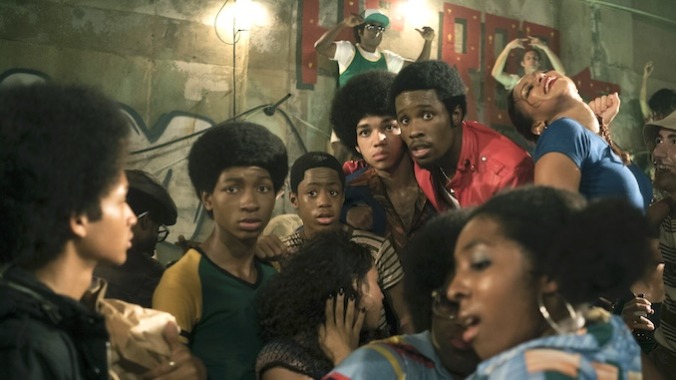One Season Wonders: Baz Luhrmann’s The Get Down Threw in Everything (Except Subtlety)
Photo Courtesy of Netflix
In the years before streaming, extremely niche TV shows faced uphill battles against cancellation. As a result, TV history is littered with the corpses of shows struck down before their time. In One Season Wonders, Ken Lowe revisits one of the unique, promising scripted shows struck down before they had a chance to shine.

You can assess a TV show by whether or not it is “good” or “bad,” certainly. Does the lighting capture the scene, or the framing of the camera communicate spatial relationships clearly, or does the editing leave in what’s important and take out what isn’t? You can complain about the episode order or number—did we really need that season to be 26 episodes when 13 would’ve done? You can quibble over whether the script could use some polish or if there’s a weak link in the cast, or hem and haw about how true to life it is to the time period it is meant to be set in. You probably should do those things, if you’re going to set a television show in the Bronx in 1977—a setting that evokes a goddamn aesthetic and which unavoidably invites scrutiny when it comes to sensitivity about race, class, and cultural history.
Or, you could actually just tell your cast to have too much fun. In 2016, Australian director Baz Luhrmann—of Romeo + Juliet and Moulin Rouge fame—was presented with this choice. It’s my opinion that he made the right one, crafting a show too confident in how f—king badass it was to bother with things like subtlety, nuance, restraint, or not standing and delivering because you are in love with Herizen Guardiola. You will see DJing and tagging referred to with the same solemnity as embarking upon a quest to avenge the disrespect done upon the Shaolin Temple. You will see Shameik Moore leaping around the rooftops of New York in bright red kicks a full two years before Spider-Man: Into the Spider-Verse. You will see Giancarlo Esposito reporting for duty in a Latino-American role, and Jimmy Smits playing the fierce-but-warm Latino patriarch. You will see Jaden Smith having a gay kiss in an underground disco, but intercut with shots of a boob so that it is okay.
You will, sadly, never see a second season.
The Show
It’s the summer of 1977 in the Bronx, and two young lovers are dreaming of becoming something greater. The orphaned Zeke (Justice Smith) has the makings of a true poet of the people but won’t work up the courage to present his work, and the songstress Mylene (Guardiola) wants to become a disco star but is forbidden from doing anything non-God-related by her overbearing father (Esposito). Zeke is determined to become an artist and win Mylene’s heart. It’s clear from the jump that the two are stupid for each other, but Mylene sees any attachment to Zeke as an anchor weighing her down in her quest to leave the Bronx and achieve the stardom she desires.
Zeke won’t give up that easily, though, and sets his sights on crashing the very party where Mylene will try to debut her demo tape. It’s all going down at the mobbed up Les Inferno Club, where coke queen Fat Annie (Lillias White) and her son Cadillac (Yahya Abdul-Mateen II) run the borough. In a misguided bid to catch Mylene’s attention, Zeke lays hands on the rarest of records. It just so happens to be the same MacGuffin sought by the mysterious Shaolin Fantastic (Shameik Moore), who is tasked by his DJ mentor Grandmaster Flash to recover it in order to complete his DJ training.
We must pause after that sentence. Moore is decked out in ’70s splendor and has somehow mastered urban tagging, DJing, kung fu, and parkour at a tender age. He wears a Bruce Lee belt buckle, and exits most scenes by leaping over a precipice in a pose worthy of Spider-Man or the protagonist of an Assassin’s Creed game. Yes, Grandmaster Flash is supposed to be the Bronx legend of hip hop and member of Grandmaster Flash and the Furious Five. This is the degree of subtlety the show maintains throughout its runtime.
Above and around the stories of the give-em-hell young people is the one about the changing political times of a bankrupt city. Much of that stratum of the plot falls on Mylene’s uncle Francisco “Papa Fuerte” Cruz (Smits, who is definitely a pure-intentioned good guy but who has some scenes where he seriously looks like he’s the villain in a movie starring a plucky cartoon dog. I don’t know what happened! I know he’s still awesome.)
Whether you think this show is good or bad is almost immaterial. It is Baz Luhrmann, and there is absolutely nothing that can compare. The show’s framing device is Daveed Diggs rapping about his upbringing in the far off future of 1996 (though the actual rapping is, for some reason, done by Nas). These occasional interludes are not just plot recaps, they are so on the nose that no viewer who is paying even the minimum amount of attention can possibly miss not just the plot, but every aspect of the themes and conflicts. One scene in a mid-season episode features Zeke, Shao, and Mylene’s skeezy manager all being offered power in exchange for a surrender of their principles and dignity. These three scenes are synchronized, filmed in lavish slow motion, with the tempters absolutely chewing the scenery. There is no interpretation necessary to enjoy The Get Down.
